Perks of Play : Toy Kitchens & Play Food

Imitating real-life skills and scenarios - such as preparing, cooking, serving, and eating food - is a form of play that comes naturally to children. Encouraging and facilitating their pretend play with age-appropriate resources - think: toy kitchens, play food, and/or open-ended materials - will support their development in numerous ways.
To get you started, here are just a few ideas you can implement to turn toy kitchens and play food into fun and educational play :

- Sorting and Classifying: Sort the play food by color, shape, food group (fruits, veggies, etc.), or even by meal (breakfast, lunch, dinner).
- Sensory Play: Create a pretend garden in a bin filled with rice or beans. Hide toy vegetables for your child to "harvest."
- Counting and Matching: Practice counting skills by sorting the food or setting up a mini grocery store with a play cash register.
- Play "What's Missing?" by hiding a piece of food and having your child guess which one is gone.
- Learning Through Touch: Put play food in a bag and have your child identify them by touch only. This is great for toddlers and helps with sensory development.
- Restaurant Roleplay: Set up a pretend restaurant with menus (use paper or a chalkboard) and take turns being the chef, waiter, and customer.
-
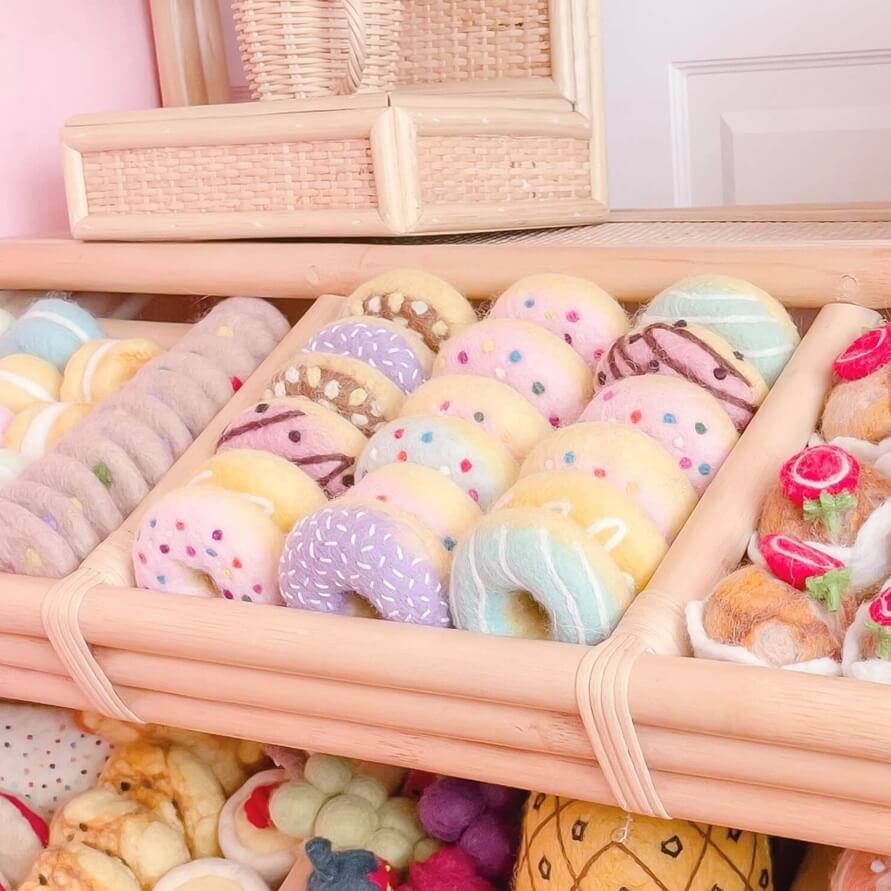 Camping Feast: Pack up a basket with toy food and head outside for a pretend picnic or camping trip.
Camping Feast: Pack up a basket with toy food and head outside for a pretend picnic or camping trip. - Tea Party Time: Set the table with toy dishes and have a fancy tea party with stuffed animals or dolls as guests.
- Bonus: Combine play food with other toys! Let toy cars deliver groceries, have stuffed animals enjoy a pretend tea party, or build a block "kitchen" for the play food chefs.
Consider the learning opportunities presented in the above activities. Keep in mind that there is no need to micromanage or direct the play. Children are wired to constantly make discoveries and consolidate what they learn through their own exploration.
Let's take a more in depth look at the developmental benefits :
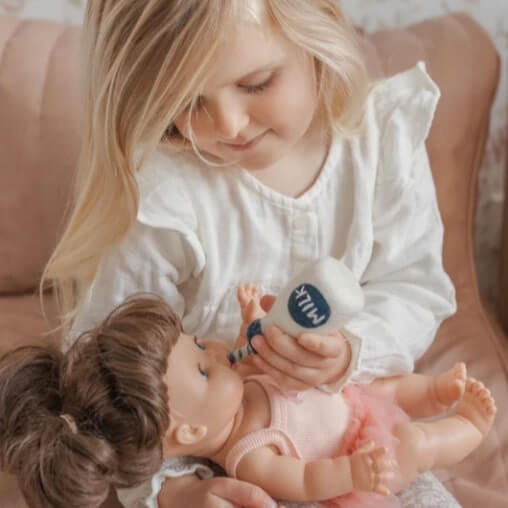 Imagination and Creativity: Inventing stories, scenarios, and characters related to cooking and dining, helps them develop their creativity and problem-solving skills.
Imagination and Creativity: Inventing stories, scenarios, and characters related to cooking and dining, helps them develop their creativity and problem-solving skills.
Language Development: Play with toy kitchens and play food often involves communication and conversation, especially if you join in! This allows children to develop their language skills. They can learn new words, practice sentence construction, and improve their vocabulary.
Maths Skills: Measuring ingredients, counting, and dividing portions of play food can assist in introducing new maths concepts while improving on skills they may already have.
Fine Motor Skills: Manipulating kids' kitchen utensils and play food items helps develop fine motor skills. This can improve hand-eye coordination, finger dexterity, and muscle control.
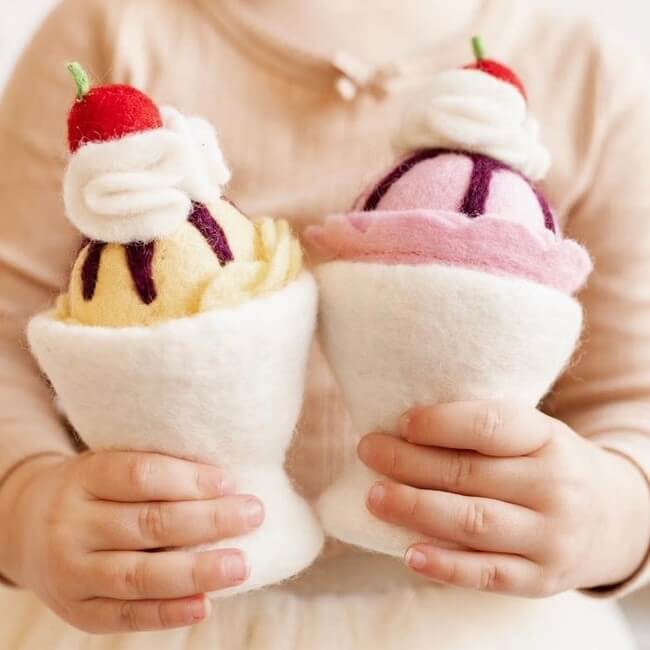 Social Skills: Playing with others in a pretend kitchen setting
Social Skills: Playing with others in a pretend kitchen setting  encourages social interaction and cooperation, as they take on roles, negotiate, share responsibilities, and work together with their peers. It is also an opportunity to rehearse social expectations such as food etiquette and good manners.
encourages social interaction and cooperation, as they take on roles, negotiate, share responsibilities, and work together with their peers. It is also an opportunity to rehearse social expectations such as food etiquette and good manners.
Problem Solving: Children will encounter various challenges during pretend kitchen play, such as deciding what to cook, managing resources, and adapting to unexpected situations. This helps them develop problem-solving skills and critical thinking.
Understanding Roles and Responsibilities: Pretend play in a kitchen setting allows children to understand roles and responsibilities related to food preparation, serving, and cleaning up. They can learn about the division of labor and teamwork.
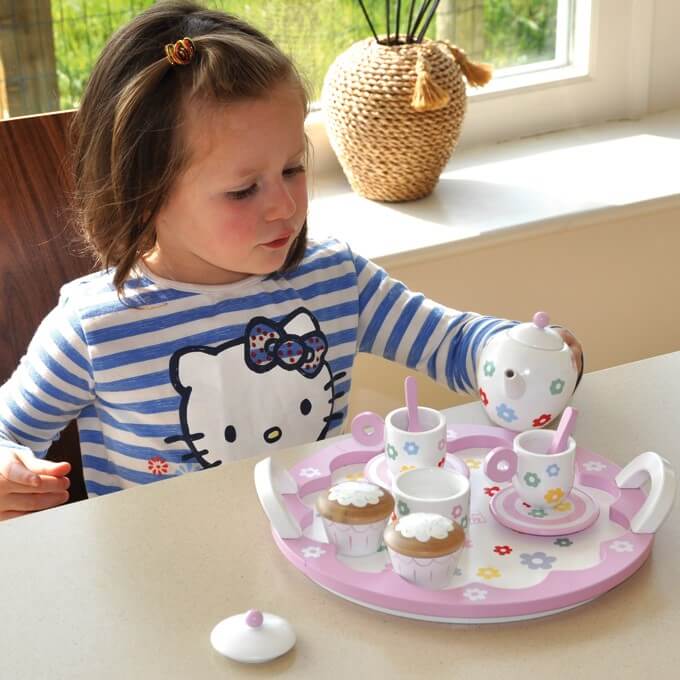 Empathy and Emotional Expression: Children often incorporate emotions and social interactions into their play kitchen scenarios, providing opportunities to explore and express their feelings, understand others' emotions, and practice empathy.
Empathy and Emotional Expression: Children often incorporate emotions and social interactions into their play kitchen scenarios, providing opportunities to explore and express their feelings, understand others' emotions, and practice empathy.
Cultural Awareness: Through play, children can learn about different foods, cooking techniques, and cultural aspects related to cuisine. This can foster an appreciation for diversity and global cultures.
 Healthy Eating Habits: Play food can be used as an educational tool to teach children about basic nutrition and the importance of a balanced diet. (We highly recommend checking out the the Kids Eat In Color website for evidence-based info on how to talk to children about food.)
Healthy Eating Habits: Play food can be used as an educational tool to teach children about basic nutrition and the importance of a balanced diet. (We highly recommend checking out the the Kids Eat In Color website for evidence-based info on how to talk to children about food.)
Confidence and Independence: Pretend play allows children to take on roles and make decisions, promoting confidence and a sense of independence.
Parent-Child Bonding: Parents and caregivers can play in the kids kitchen too, especially if invited. This can strengthen the parent-child bond and create opportunities for quality time together.
In summary, playing with pretend kitchen and food toys is a fun and educational way for children to work on a wide range of skills and attributes that are crucial for their overall development. It provides a platform for them to explore and understand the world around them while honing important life skills.
Imitating real-life skills and scenarios - such as preparing, cooking, serving, and eating food - is a form of play that comes naturally to children. Encouraging and facilitating their pretend play with age-appropriate resources - think: toy kitchens, play food, and/or open-ended materials - will support their development in numerous ways.
To get you started, here are just a few ideas you can implement to turn toy kitchens and play food into fun and educational play :

- Sorting and Classifying: Sort the play food by color, shape, food group (fruits, veggies, etc.), or even by meal (breakfast, lunch, dinner).
- Sensory Play: Create a pretend garden in a bin filled with rice or beans. Hide toy vegetables for your child to "harvest."
- Counting and Matching: Practice counting skills by sorting the food or setting up a mini grocery store with a play cash register.
- Play "What's Missing?" by hiding a piece of food and having your child guess which one is gone.
- Learning Through Touch: Put play food in a bag and have your child identify them by touch only. This is great for toddlers and helps with sensory development.
- Restaurant Roleplay: Set up a pretend restaurant with menus (use paper or a chalkboard) and take turns being the chef, waiter, and customer.
- Camping Feast: Pack up a basket with toy food and head outside for a pretend picnic or camping trip.
- Tea Party Time: Set the table with toy dishes and have a fancy tea party with stuffed animals or dolls as guests.
- Bonus: Combine play food with other toys! Let toy cars deliver groceries, have stuffed animals enjoy a pretend tea party, or build a block "kitchen" for the play food chefs.


Consider the learning opportunities presented in the above activities. Keep in mind that there is no need to micromanage or direct the play. Children are wired to constantly make discoveries and consolidate what they learn through their own exploration.
Let's take a more in depth look at the developmental benefits :
Imagination and Creativity: Inventing stories, scenarios, and characters related to cooking and dining, helps them develop their creativity and problem-solving skills.
Language Development: Play with toy kitchens and play food often involves communication and conversation, especially if you join in! This allows children to develop their language skills. They can learn new words, practice sentence construction, and improve their vocabulary.

Maths Skills: Measuring ingredients, counting, and dividing portions of play food can assist in introducing new maths concepts while improving on skills they may already have.
Fine Motor Skills: Manipulating kids kitchen utensils and play food items helps develop fine motor skills. This can improve hand-eye coordination, finger dexterity, and muscle control.
Social Skills: Interacting with others in a play kitchen setting encourages social interaction and cooperation, as they take on roles, negotiate, share responsibilities, and work together with their peers. It is also an opportunity to rehearse social expectations such as food etiquette and good manners.

Problem Solving: Children will encounter various challenges during pretend kitchen play, such as deciding what to cook, managing resources, and adapting to unexpected situations. This helps them develop problem-solving skills and critical thinking.
Understanding Roles and Responsibilities: Pretend play in a kitchen setting allows children to understand roles and responsibilities related to food preparation, serving, and cleaning up. They can learn about the division of labor and teamwork.
Empathy and Emotional Expression: Children often incorporate emotions and social interactions into their play kitchen scenarios, providing opportunities to explore and express their feelings, understand others' emotions, and practice empathy.

Cultural Awareness: Through play, children can learn about different foods, cooking techniques, and cultural aspects related to cuisine. This can foster an appreciation for diversity and global cultures.
Healthy Eating Habits: Play food can be used as an educational tool to teach children about basic nutrition and the importance of a balanced diet. (We highly recommend checking out the the Kids Eat In Color website for evidence-based info on how to talk to children about food.)
Confidence and Independence: Pretend play allows children to take on roles and make decisions, promoting confidence and a sense of independence.

Parent-Child Bonding: Parents and caregivers can play in the kids kitchen too, especially if invited. This can strengthen the parent-child bond and create opportunities for quality time together.
In summary, playing with pretend kitchen and food toys is a fun and educational way for children to work on a wide range of skills and attributes that are crucial for their overall development. It provides a platform for them to explore and understand the world around them while honing important life skills.
- The Toy Chest Australia
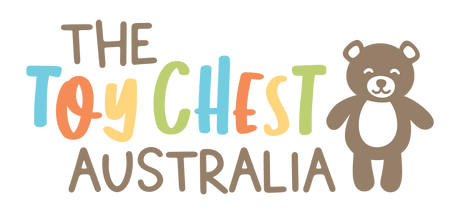

Comments 0